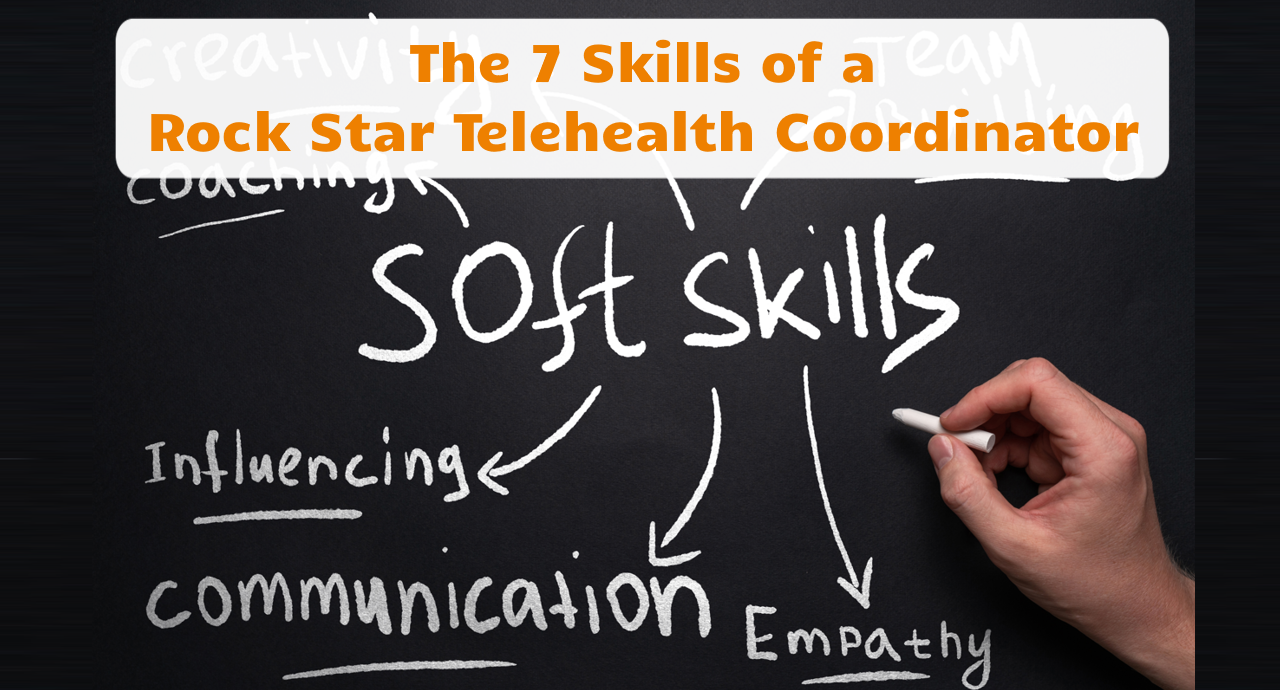In last week’s Telehealth Tuesday I described the 7 critical qualities, 4 responsibilities, and 7 key skills that make a Telehealth a Rock Star in their profession:
- Customer Service Skills (Customers = Everybody)
- Change Management
- Project Management
- Clinical Workflow Design
- Workflow and Technology Training Design
- Telehealth Technology Knowledge
- Data Analysis and Presentation
In today’s edition, I am delving deeper into the skill set that Telehealth Coordinators must become proficient in to perform at the Rockstar level.
The Soft Skills
As in most other professions, the foundation of high performance lies within a set of core soft skills: Customer Service, Change Management, and Project Management. While these 3 skills also include “hard skills”, their core requires a set of soft skills.
Customer Service Skills are key for Telehealth Coordinators because as a central support resource without managerial authority, everybody in the organization becomes the Telehealth Coordinator’s customer: patients, providers, nurses, MAs, front office staff, IT support, facilities, billing support, leadership, etc.
Change Management Skills are equally if not even more important. Optimizing, growing, and expanding telehealth services is all about convincing others to do things a bit differently than they have in the past. I.e., a Telehealth Coordinator’s job is to change the way people work, and people, by default, do not like to change.
Project Management Skills are key, because over 80% of the telehealth coordinator’s job are little mini projects that oftentimes involve a multidisciplinary team across the organization to complete successfully .
Here are some of the key underlying “soft skills” that every Project Coordinator should be mentored and coached in to be effective in the three skills above:
Communication Skills: the ability to communicate clearly and effectively to every level of the organization is key for customer service (adjusting one’s communication to resolve issues), for change management (clearly articulating telehealth’s vision and benefits and respectfully listening to concerns and ideas are key to securing buy-in), and for project management (e.g., to enroll others and hold them accountable).
Negotiation Skills: the ability to influence others stems from the Telehealth Coordinator’s ability to negotiate respectfully and to go after win-win scenarios. Oftentimes different stakeholders will have conflicting ideas that need to be resolved.
Influence Skills: Without positional power, Telehealth Coordinators can only be successful through their ability to influence other people. This is especially true for the Change Management and Project Management skills. The ability to influence requires a high degree of empathy to be able to put oneself in someone else’s shoes, see the situation through their eyes, and being able to address the “WIIFM”, the “What’s in it for me” question that is automatically on everyone’s mind.
Adaptability: bringing about change is never easy and with providers in the target audience, there are strong minds at play that need to be accommodated. In addition, the reality of care delivery calls for modifications and compromises to be made in order to make process or solution work in each idiosyncratic environment.
Problem-Solving Skills: The bulk of a Telehealth Coordinator’s job is to address issues that are popping up on a daily basis. A Rock Star Telehealth Coordinator will be able to quickly identify the root cause(s) of the issue, use their customer service skills to assure the user of a quick resolution and then project manage a quick fix or, ideally, a systemic fix that prevents a similar problem from occurring in the future.



The Hard Skills
While soft skills are best taught by experience, coaching, and mentoring over a longer period of time, hard skills can be acquired relatively quickly through a combination of didactics and guided practice.
Here are the “hard skill” characteristics of all 7 skills of a Rock Star Telehealth Coordinator:
Customer Service Skills: While this skill mostly relies on soft skills, the “hard skills” include the ability to (1) establish and master easy-to-use tools by which users can convey problems, to (2) systematically capture, track, and follow up on issues (e.g., in a spreadsheet or database), to (3) develop and leverage typical responses to the 80% of the problems in a knowledge base.
Change Management: The ability to bring about change is crucial to the success and Telehealth Coordinators must become diligent students and practitioners of common change management approaches tailored to the organization and their personality. My two favorite frameworks are the ADKAR® model by the Prosci-Institute and the Elephant-Rider-Path model described in the book Switch by Chip & Dan Heath.
Project Management takes an equal amount of soft skills and hard skills, whereas the hard skills include the mastery of (1) project scoping, (2) project planning, (3) project scheduling, (4) project tracking, (5) risk management, (6) task management, (7) time management, (8) stakeholder management, (9) communication management, and, of course (10) proficiency with at least one project management tool.
Clinical Workflow Design: At the core of successful telehealth programs lies their ability to design and implement effective and efficient clinical workflows that address the various aspects of a telehealth service. E.g., for a video visit this includes 7 workflows for scheduling, onboarding, rooming, visiting, post-visit, follow-up, and billing. A Rock Star Telehealth Coordinator must be highly proficient in the design of Clinical Workflows — starting from Happy Day Scenarios and focusing on the design of smooth workflows.
Workflow and Technology Training Design: To bring about true change, it is critical that the key aspects of well-designed telehealth services are learned by all users. Given the variety of users (from clinicians to front office staff), a Rock Star Telehealth Coordinator can fit their training to the audience. Creativity is key to overcoming resistance to change (or even to learning). E.g., one Rock Star Telehealth Coordinator created a well-received, fun “Quiz” that in a playful way educated the audience about the nuanced aspects of their work.
Telehealth Technology Knowledge: This skill is purposefully listed as almost the last one. While a technical affinity (and curiosity) is key for the success of a Telehealth Coordinator, very little other technical knowledge is needed beyond what is typically quickly learnable in a matter of hours. Over time, Telehealth Coordinators should also familiarize themselves with peripheral devices (webcams, headsets & speakers but also remote exam tools such as otoscopes or a digital stethoscope) that best suit their needs.
Data Analysis and Presentation: While this is definitely a more advanced skill that only more mature organizations will need, it is an aspect of telehealth performance that should be measured as the standard from Day 1. The main hard skills here include the ability to manipulate spreadsheets and pivot tables to (1) capture, (2) meaningfully analyze and (3) present that data.
Training, Coaching, and Mentoring For Success
As I described in the first article about Rock Star Telehealth Coordinators, these high performing individuals are not born, but definitely made.
What it takes, though, is an investment of time and knowledge to assist telehealth coordinators to ascend to the Rockstar level. While there are many basic certification courses available, to our knowledge none covers the breadth and depth of skills described in these articles.
Rather, Telehealth Coordinators should be encouraged (and funded) to seek education in the aforementioned 7 skills. Alternatively, engaging a telehealth coach and mentor or having a newly-minted telehealth coordinator work alongside an experienced telehealth optimization consultant will vastly accelerate the proficiency of a Telehealth Coordinator at any level.
Become knowledgeable about how your Telehealth Program can succeed. Let’s have a conversation about getting your telehealth coordinator perform at their highest level: tiny.cc/thc-discussion








To receive articles like these in your Inbox every week, you can subscribe to Christian’s Telehealth Tuesday Newsletter.
Christian Milaster and his team optimize Telehealth Services for health systems and physician practices. Christian is the Founder and President of Ingenium Digital Health Advisors where he and his expert consortium partner with healthcare leaders to enable the delivery of extraordinary care.
Contact Christian by phone or text at 657-464-3648, via email, or video chat.








